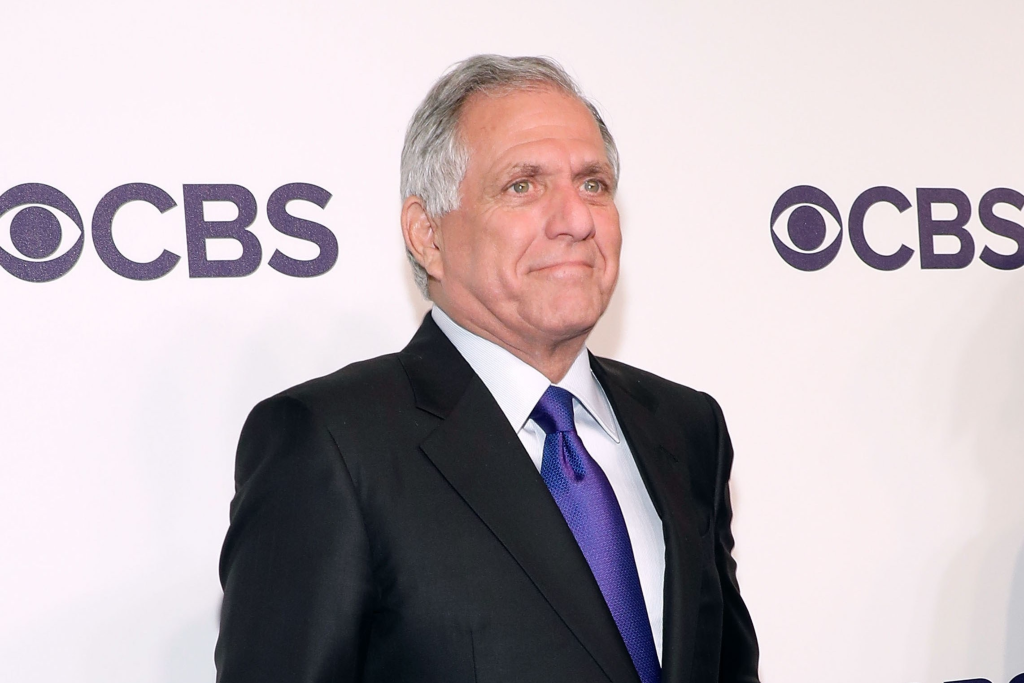Les Moonves Out At CBS Amid Sexual Harassment Allegations
The #MeToo movement brings down the head of a Fortune 500 company.

Les Moonves, the longtime Chief Executive Officer of CBS, has stepped down amid yet another example of the fallout of the revelation of sexual harassment allegations in the wake of the MeToo movement:
Leslie Moonves, the longtime chief executive of the CBS Corporation, stepped down on Sunday night from the company he led for 15 years. His fall from Hollywood’s highest echelon was all but sealed after the publication earlier in the day of new sexual harassment allegations against him.
The CBS board announced his departure, effective immediately. As part of the agreement, the network said it would donate $20 million to one or more organizations that support equality for women in the workplace. The donation will be deducted from a potential severance benefit to Mr. Moonves, although he could still walk away with more than $120 million, according to two people familiar with the settlement agreement.
Mr. Moonves, however, will not receive any severance payment, until the completion of an independent investigation into the allegations, the board said. He could also receive nothing, based on the investigation’s results.
Joseph Ianniello, the chief operating officer of CBS and one of Mr. Moonves’s closest advisers, was named the interim chief executive.
The departure of Mr. Moonves marks a stunning reversal for an executive who is credited with turning CBS into television’s most-watched network. But he has been under intense pressure since July, when The New Yorker published an article by the investigative journalist Ronan Farrow in which six women accused Mr. Moonves of sexual harassment. On Sunday, the magazine published another article by Mr. Farrow in which six more women detailed claims against Mr. Moonves.
Mr. Moonves is the latest high-powered entertainment figure to be ousted from his perch in the #MeToo era. The movie producer Harvey Weinstein has been accused by scores of women of sexual assault and now faces felony charges. Matt Lauer stepped down as the anchor of NBC’s most valuable news program, “Today,” after several women alleged incidents of sexual harassment. Charlie Rose of CBS and PBS left the airwaves after he, too, was implicated by multiple women. And Fox News saw the departures of the founding executive Roger Ailes and its top-rated host, Bill O’Reilly. All of those men have denied any nonconsensual sexual activity.
Many of the men who have been toppled spent years determining what TV shows, movies and news programs millions of Americans watched on a daily basis. The allegations go back years — in some cases even decades. And the wave of scandals is a stark reminder of how male-dominated the entertainment and news industries remain, especially in their upper ranks.
When the most recent television season ended in May, CBS was the nation’s most-watched network for the 10th consecutive year — an accomplishment that had made Mr. Moonves one of the most powerful figures in Hollywood. Now his departure has helped cast the future fortunes of the company in doubt.
For several weeks, Mr. Moonves has been grappling with two separate but equally fateful issues while negotiating a settlement with CBS Corporation’s board of directors on his exit. In addition to the multiple harassment allegations against him, Mr. Moonves has been involved in a protracted legal fight with the company’s controlling shareholder, Shari Redstone. All parties have now agreed to dismiss the lawsuit. The company also announced that it was adding six members to its board. The new slate of directors adds three women to the 12-member board, raising the number of female members to six.
The talks included a potential payout to Mr. Moonves that could have been as much as $280 million, according to one of the people briefed on the matter, before board members negotiated that down to more than $120 million. But a security filing from April states that the company would not have to pay Mr. Moonves if the board fired him for cause, such as violating company policies regarding sexual harassment.
The size of the payout had been a source of contention in the negotiations, according to three people familiar with the discussions who spoke on condition of anonymity to discuss a private bargaining agreement.
That Mr. Moonves could receive any money for stepping away from CBS in the wake of the allegations outraged many in the entertainment industry and in the #MeToo movement.
“It’s completely disgusting,” one of the accusers, Jessica Pallingston, told The New Yorker about the reports of Mr. Moonves’s potential exit package, which had been reported last week to total more than $100 million. “He should take all that money and give it to an organization that helps survivors of sexual abuse.”
The pace of the board’s deliberations accelerated after Mr. Farrow contacted the board last week regarding his latest article, according to one of the people familiar with the negotiations.
The incidents described in the two articles went back to the 1980s and brought the number of women now accusing Mr. Moonves of harassment to 12.
The women claim that Mr. Moonves, 68, had forced himself on them and in some cases retaliated professionally after some declined his advances. One woman, a veteran television executive named Phyllis Golden-Gottlieb, filed a complaint with the Los Angeles Police Department last year, according to The New Yorker. She said Mr. Moonves forced her to perform oral sex on him and, in another instance, had “violently” thrown her against a wall.
Ms. Golden-Gottlieb described encounters as having occurred nearly 40 years ago when Mr. Moonves was the leading executive at Lorimar Television. But other women in the article detailed harassment that they said happened while Mr. Moonves was at CBS. Mr. Moonves joined the network in 1995 and became chief executive of the company in 2003.
Mr. Moonves didn’t respond to requests for comment from The New York Times on Sunday, but told The New Yorker, “The appalling accusations in this article are untrue.” He admitted to “consensual relations” with three of the women.
“In my 40 years of work, I have never before heard of such disturbing accusations,” Mr. Moonves continued. “I can only surmise they are surfacing now for the first time, decades later, as part of a concerted effort by others to destroy my name, my reputation, and my career.”
As noted, the reports at issue were first made public in a piece at The New Yorker detailing the accounts of a number of women, both named and unnamed, who say that they were sexually harassed by Moonves and/or other executives at CBS and in several cases essentially forced to engage in sexual conduct if they wanted to continue being employed by the network. These allegations were unearthed by Ronan Farrow and his team of investigators who, of course, had previously been the source of the first allegations against Hollywood producer Harvey Weinstein, who has since been charged with sexual assault in New York City and could face similar charges in other jurisdictions around the country. Farrow won the Pulitzer Prize for that reporting, and in the wake of that report about Weinstein, Farrow also came out with several other reports about celebrities and other notable people who have been accused of similar misconduct. When that report first dropped, of course, Moonves denied the allegations but numerous reports indicated that CBS had begun negotiations regarding an exit strategy for Moonves. Those negotiations apparently became more urgent late last week when it was reported that Farrow and his team had uncovered new allegations against Moonves from additional women, something that Farrow confirmed yesterday morning during a telephone interview with CNN’s Brian Stelter. At that point, it is apparent that the negotiations took on a new urgency as CBS’s board was eager to disassociate Moonves from the company.
While this kind of behavior has been swept under the rug for decades, the last several years have seen a marked changed in how this behavior is treated and how the women who make these allegations are treated when they do come forward The trend actually began last year with the revelations coming out of Fox News Channel regarding people such as Roger Ailes and Bill O’Reilly, both of whom were ultimately removed from their seemingly untouchable positions. The trend began to pick up steam, though, in the wake of a round of revelations that began last month. It started, not surprisingly, in the entertainment industry with allegations against people such as Bill Cosby, Harvey Weinstein, Kevin Spacey, filmmaker Bruce Ratner, George Takei, Charlie Rose, political pundit Mark Halperin and Matt Lauer. In the political world, it has led to accusations about men such as Roy Moore, Al Franken, Michigan Congressman John Conyers. and Texas Congressman Blake Farenthold. The movement has also reached the Oval Office given the impact of things such as the so-called Access Hollywood tape, the allegations by nineteen separate women that they were sexually harassed by Donald Trump, and by the allegations made against the President by women such as Stormy Daniels and Karen McDougal. Most recently, of course, Bill Cosby was found guilty of three counts of sexual assault in a Pennsylvania court, and Weinstein has been charged with sexual assault in New York City and could face additional charges in the future.
All of this, of course, gave rise to the MeToo Movement, which encouraged women at all levels of society to share their own stories of having been sexually assaulted or harassed either in the workplace or elsewhere, and the impact of that movement continues to reverberate throughout society. Among other things, it has resulted in a record number of women running for office in this year’s midterm elections, both at the Federal and state level, a development that could have a real impact on the number of women in prominent political positions across the United States. This could have a real impact on the direction of American politics, and on the terms of the political debate in the United States.
It’s hard to understate the importance of Moonves’s departure cannot be understated. While he certainly isn’t the first member of the entertainment industry to be brought down over the past year, he is the first head of a Fortune 500 company to suffer this fate. Additionally, the fact that the sexual harassment story continues to reverberate even a year after the allegations against Harvey Weinstein that started it all were made shows us that this is not something that is going to disappear easily or quickly and that we have indeed entered a new era where behavior that was once considered acceptable or swept under the rug will no longer be tolerated. For that reason alone, these revelations are a good and positive thing.





To be fair, it wasn’t just #metoo that brought down Moonves — #metoo was the tool that Shari Lansing was finally able to employ to force him out.
Not saying he didn’t do what he was accused of or that he shouldn’t have been brought to account for it. Just that in this case justice got a push from his corporate enemies…
I hope one of the positives of #MeToo is that people won’t be quite as afraid to report these incidents sooner after they occur. While I don’t particularly doubt Ms. Golden-Gottlieb, 40 years is a long time. Memories fade, evidence is lost, etc. If it weren’t for similar, more recent stories from other women, I wouldn’t be convinced one way or another.
I would believe her, but also note that back in the day, the police wouldn’t have, so…